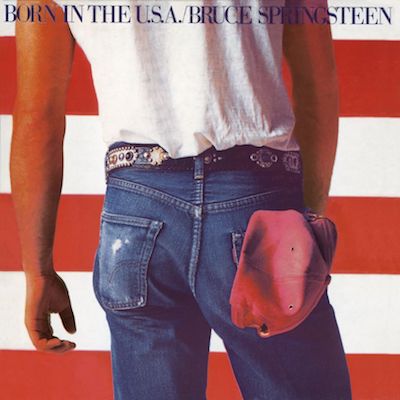
by Phil Scarisbrick
It takes a special set of circumstances to get to a place where someone who made their name in entertainment can become President of the United States of America. Give them a sweeping set of populist policies, and a powerful catchphrase like ‘Let’s Make America Great Again’. Combine that with a world where inequality and anger are growing and you have the perfect storm for such a situation to arise. Sound familiar? This is exactly what happened in the early 1980s, when Ronald Reagan surged into the White House. It is also the backdrop that inspired the composition of not only one of the biggest selling albums of all time, but also one of the most important, and misunderstood: Bruce Springsteen’s Born In The USA.
On the surface, it is the aesthetic embodiment of American triumphalism. The tightly fitted jeans and ice white t-shirt, emblazoned in front of the stars and stripes on the record’s cover – combined with its forthright title – gave Springsteen the appearance of being a jingoistic patsy for the Reagan administration. But brooding beneath this veneer is a scathing indictment of how the downtrodden had been shooed even further into the mud. Enough time had passed since the end of the Vietnam War for those who had sacrificed so much to be forgotten as a pressing concern. It was a new world where wealth and success were one and the same thing, and the ‘American Dream’ was defined by the colour green. Many of the richest people had managed to help themselves and/or their sons avoid having to subject themselves to armed conflict. Springsteen himself had not gone to Vietnam, but his exemption was due to injuries sustained in a motorcycle accident. His ire wasn’t about those who were rich enough to avoid the draft though, but the way that those people’s actions had affected the millions of men who had no choice but to be drafted. ‘Reaganomics’ was failing these people, and Bruce wanted the world to see.
A few years earlier, Springsteen had read Born On The 4th Of July, the autobiography of paralysed Vietnam veteran Ron Kovic. Shortly afterwards, a chance meeting at Los Angeles hotel had connected the two. Kovic took Springsteen to the local veteran centre where he met the men who had sacrificed so much for their country, but now seemed to have been forgotten about as the world had moved on. This experience lit a fire within Springsteen that led him to not only work with veterans, campaign and raise funds for them, but also inspired some of the most vital work of his career.
The title track is a bitter indictment of the treatment these men had experienced. Where its lyrics focus on a dislocation of the American soul, the main hook led many to believe it was some kind of extreme patriotism. But as Mark Twain said “Patriotism is supporting your country all the time, and your government when it deserves it.”
Bruce grew up in Freehold, New Jersey. The town was blue collar through and through, with the majority of its working population being employed in manufacturing. These jobs had slowly eroded though. He’d seen his father drift between a series of jobs. He’d seen his friends return from fighting for their country only to see the jobs they’d left behind no longer existed. These themes define the whole record, which is fundamentally about the gap between the American Dream and the American Reality. The Vietnam War had brought this into sharp focus, but still it was dismissed by the ‘haves’ at the expense of the ‘have nots’.
Today, we see a perverse exaggeration of these same negative forces in our political and social discourse. The subjects and themes Springsteen tackled back in 1984 are still relevant today, and the fact that they are tied up in such wonderful music means that their impact can still be felt. We feel like we’ve progressed as a society and that we’ve learned from the mistakes that our forefathers made, ensuring we won’t fall into the same traps. But the cyclical nature of politics means that although technology and our environments have evolved, we still fall back into old tropes and patterns. Born In The USA then is not so much a document that snapshots a period in history, but a lesson in how injustice and inequality will always exist, and that we need to take a stand against them. It also enshrines the idea that despite everything else that impacts people’s lives, none have such a profound effect on us than love and family.
This essay was originally published in issue one of the Secret Meeting zine, which can be purchased here.





